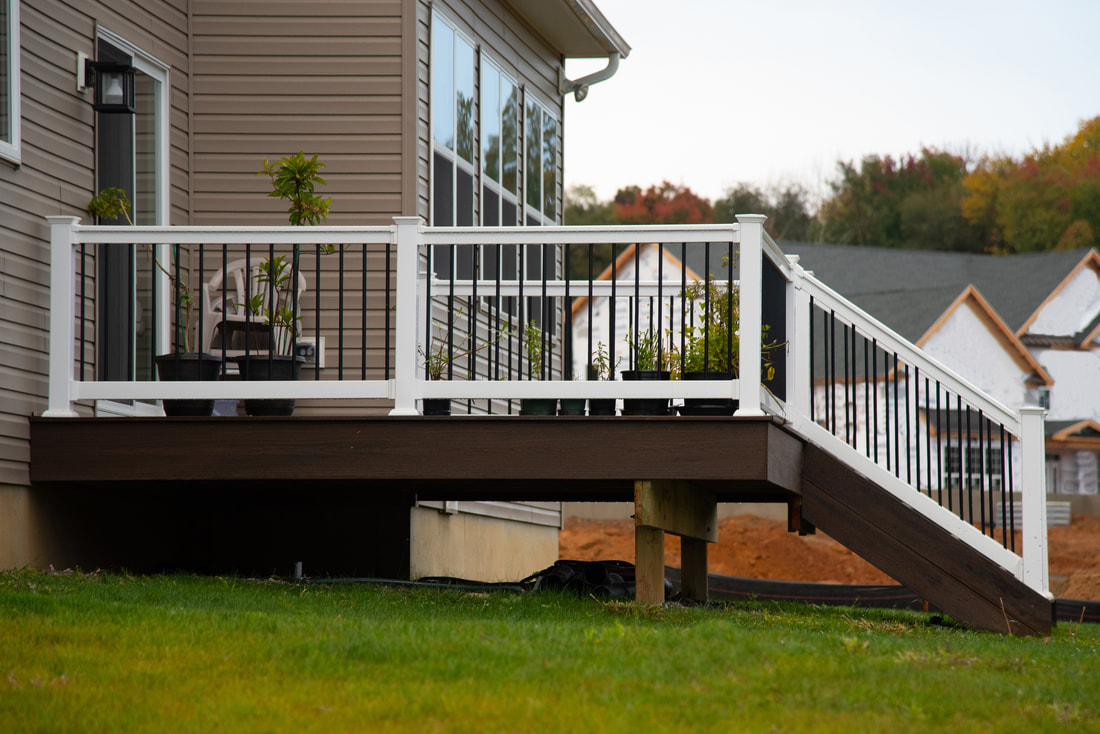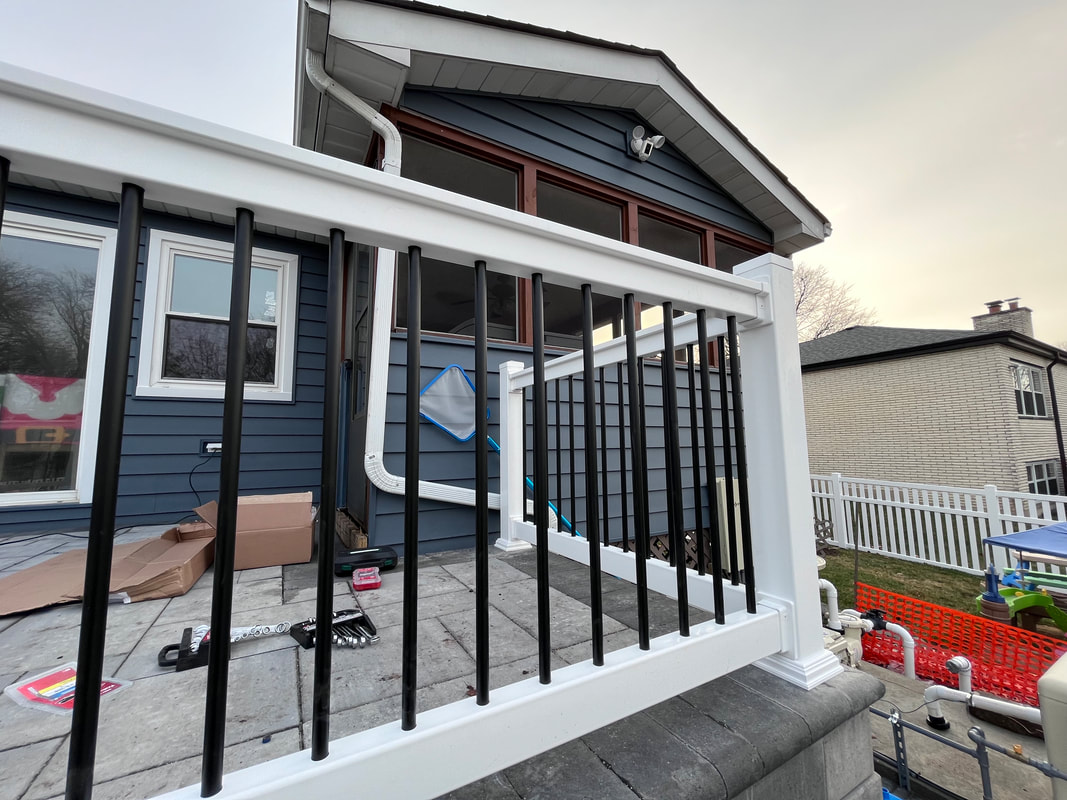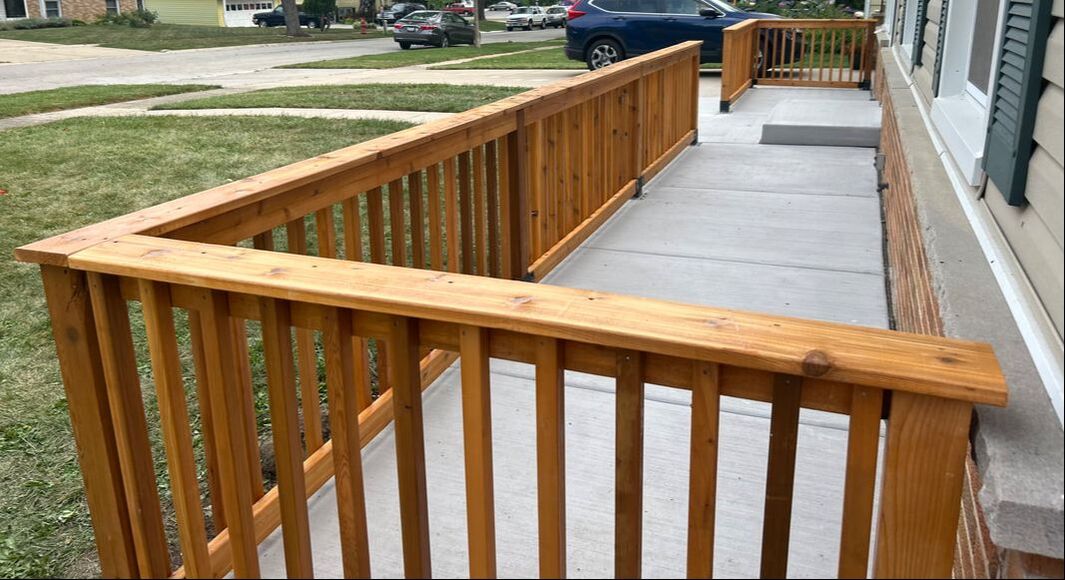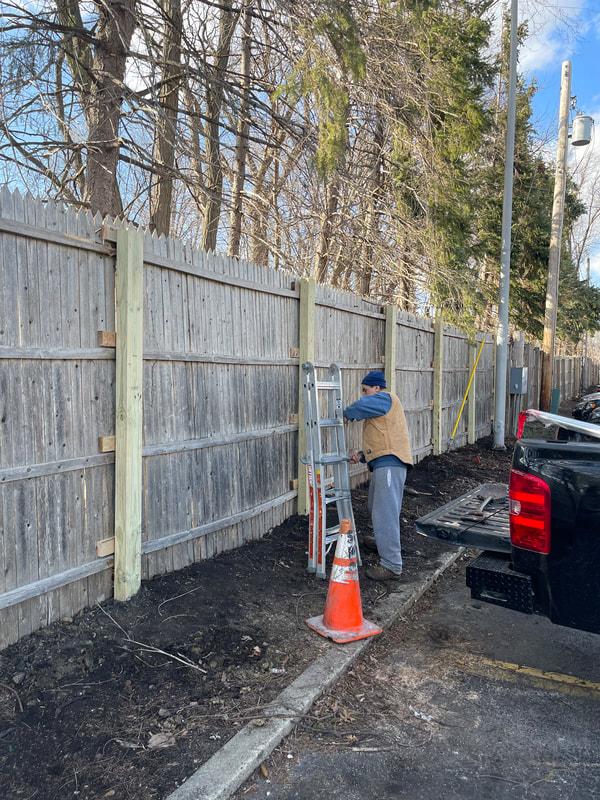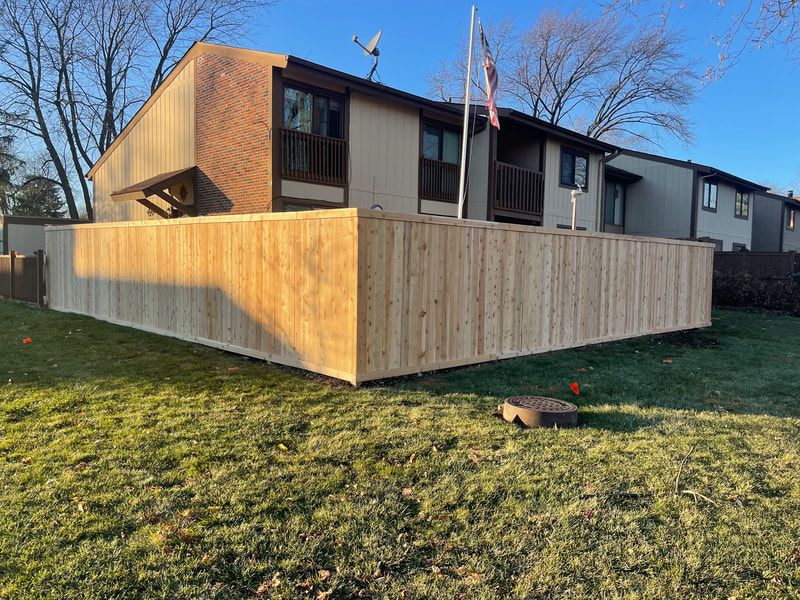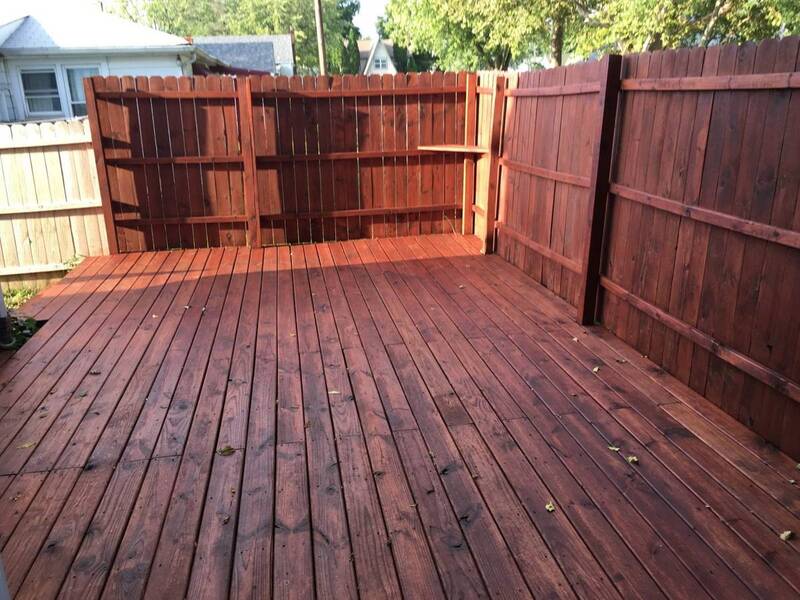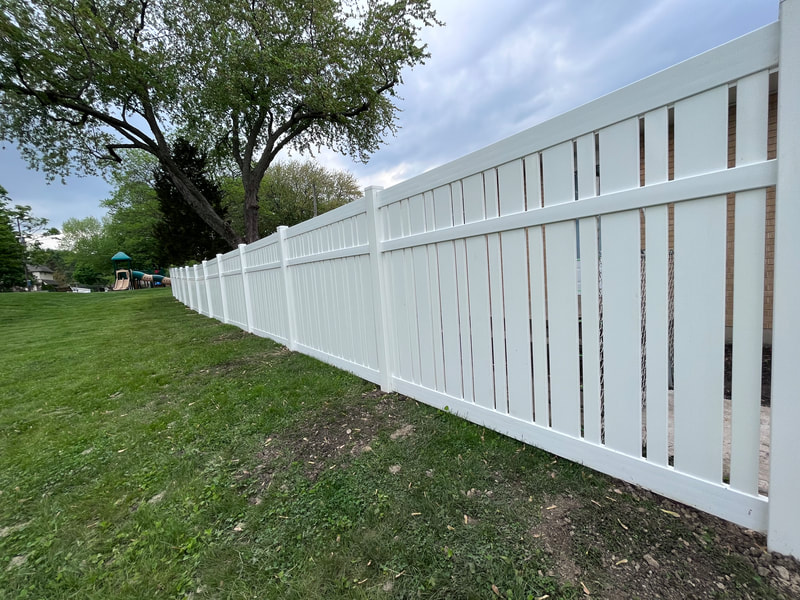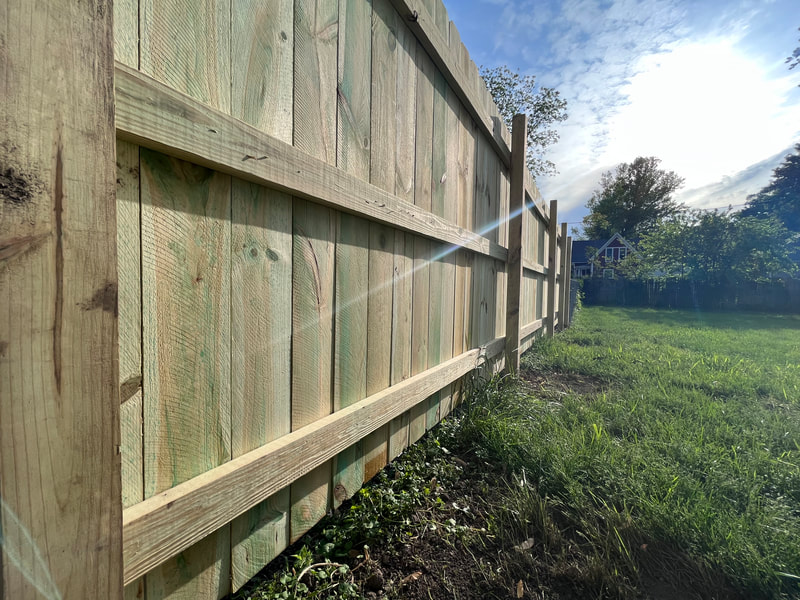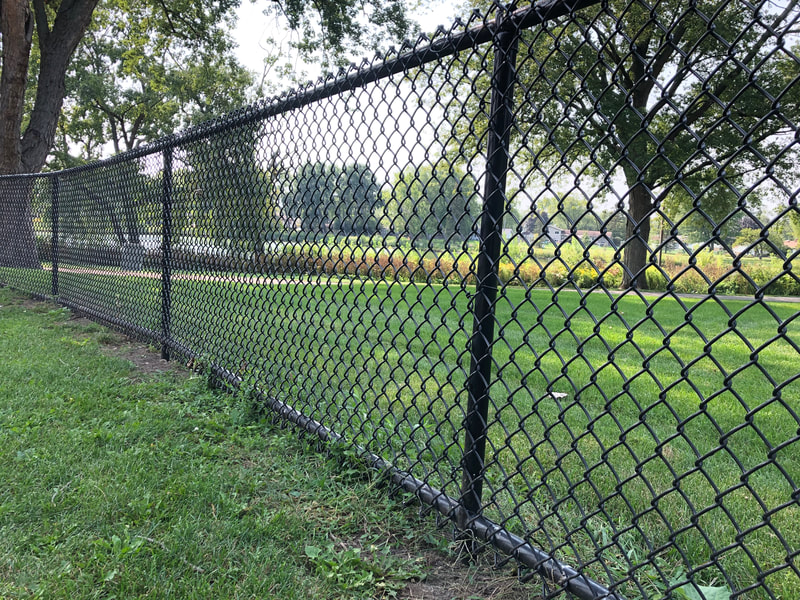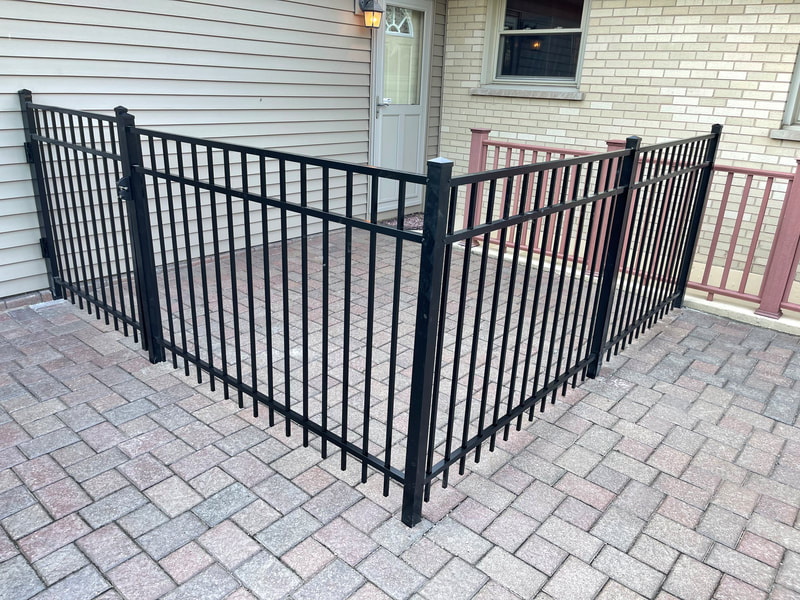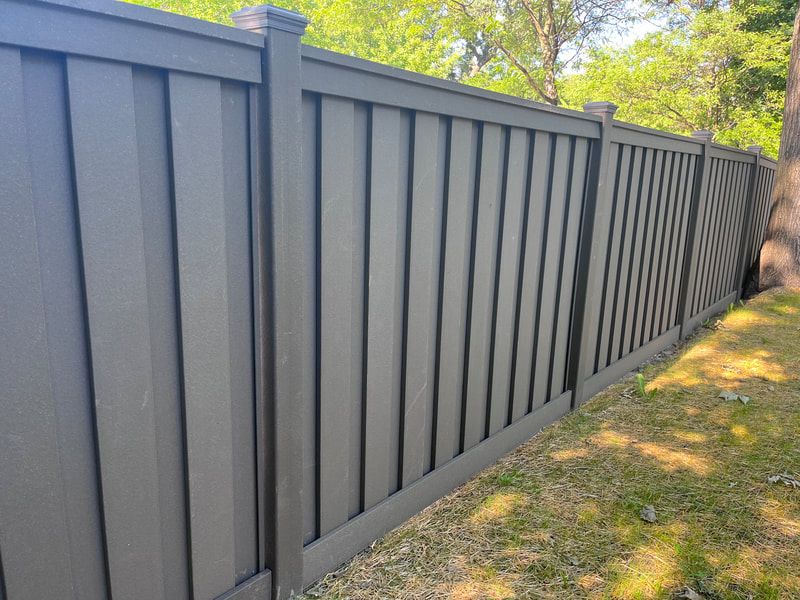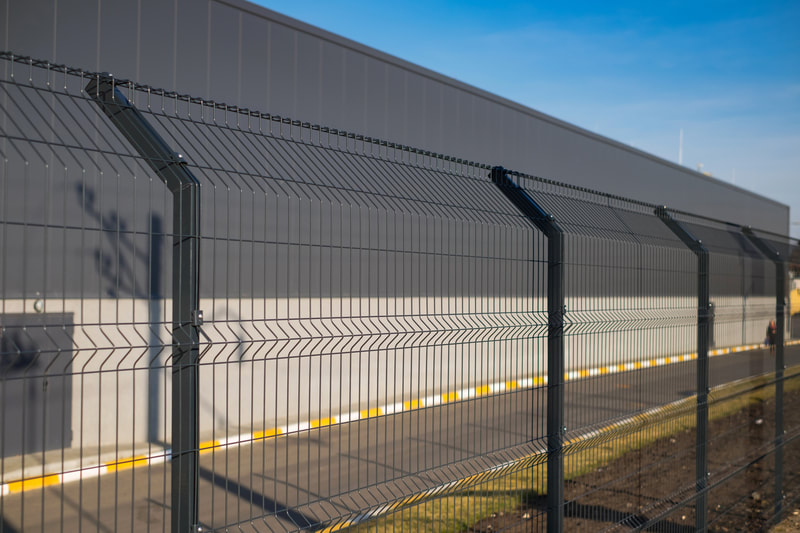Deck Railing
Installing a deck railing in Illinois involves a series of steps that adhere to both local building codes and personal design preferences. Here we will will outline the essential aspects of deck railing installation in the state of Illinois.
Please keep in mind we have a $3,500 minimum for all railing & fence projects.
Understanding Illinois Building Codes and Regulations
Before embarking on a deck railing installation project, it's crucial to familiarize yourself with the local building codes in Illinois. These codes ensure safety and compliance with state standards. Key points include railing height requirements, spacing between balusters, and load-bearing capacities. In Illinois, the typical minimum height for deck railings is 36 inches, but this can vary depending on the deck's height above ground level. It's advisable to check with your local building department for specific requirements.
Please keep in mind we have a $3,500 minimum for all railing & fence projects.
Understanding Illinois Building Codes and Regulations
Before embarking on a deck railing installation project, it's crucial to familiarize yourself with the local building codes in Illinois. These codes ensure safety and compliance with state standards. Key points include railing height requirements, spacing between balusters, and load-bearing capacities. In Illinois, the typical minimum height for deck railings is 36 inches, but this can vary depending on the deck's height above ground level. It's advisable to check with your local building department for specific requirements.
Deck Railing Installation
Designing Your Deck RailingAfter understanding the legal requirements, the next step is choosing a design for your deck railing. There's a wide range of materials and styles available, from traditional wood railings to modern glass or metal options. Each material has its benefits and drawbacks in terms of durability, maintenance, cost, and aesthetics. For instance, wood railings offer a classic look but require regular maintenance, while metal railings are durable with minimal upkeep.
Material Selection
Material Selection
- Wooden Railings: Popular for their natural look, they can be painted or stained to match your deck. Cedar, redwood, and pressure-treated pine are common choices.
- Composite Railings: These mimic the look of wood but are made from a blend of wood fibers and plastic. They are low-maintenance and resistant to rot and decay.
- Metal Railings: Options include steel, aluminum, and wrought iron. Metal railings are durable and offer sleek, modern designs.
- Glass Railings: Provide an unobstructed view and a contemporary look but can be more expensive and require regular cleaning.
Deck & Stair Railing
Safety and MaintenanceOnce your deck railing is installed, regular maintenance is important for safety and longevity, particularly for wooden railings. Inspect your railing annually for loose components, rot, or rust and address any issues promptly. Cleaning and applying a protective coating can also extend the life of your railing.
Hiring a ProfessionalWhile many homeowners opt for DIY installation, hiring a professional can ensure compliance with building codes and a high-quality finish. A professional installer can also offer design advice and handle complex installations, such as curved railings or unique materials.
Deck Railing ContractorsInstalling a deck railing in Illinois requires careful planning, adherence to building codes, and attention to detail. Whether you choose a DIY approach or hire a professional, the right deck railing can enhance both the safety and aesthetics of your outdoor space. By following these guidelines, you can achieve a successful installation that meets your needs and complements your home.
Hiring a ProfessionalWhile many homeowners opt for DIY installation, hiring a professional can ensure compliance with building codes and a high-quality finish. A professional installer can also offer design advice and handle complex installations, such as curved railings or unique materials.
Deck Railing ContractorsInstalling a deck railing in Illinois requires careful planning, adherence to building codes, and attention to detail. Whether you choose a DIY approach or hire a professional, the right deck railing can enhance both the safety and aesthetics of your outdoor space. By following these guidelines, you can achieve a successful installation that meets your needs and complements your home.
Porch Railing
Choosing the Right Deck Railing Contractor: A Guide for Homeowners
When it comes to enhancing your outdoor living space, installing a deck railing is a crucial step. Not only does it provide safety and functionality, but it also adds aesthetic appeal to your home. However, choosing the right contractor for the job can be daunting. This article provides homeowners with essential tips for selecting a deck railing contractor who can deliver quality workmanship and ensure a successful project
Understanding Your Needs and Preferences
Before beginning your search, have a clear understanding of what you want. Consider the style, materials, and design of the deck railing you envision. Do you prefer a traditional wooden look or a modern metal finish? Are you inclined towards low-maintenance materials like composite or vinyl? Knowing your preferences will help you communicate your needs clearly to potential contractors.
Researching and Gathering Referrals
Start by researching local contractors who specialize in deck railing installations. You can use online directories, search engines, and social media platforms. However, one of the most reliable sources of information is referrals from friends, family, or neighbors who have had similar work done. Personal recommendations often lead to trustworthy and proven contractors.
Checking Credentials and Experience
Once you have a list of potential contractors, check their credentials. Ensure they are licensed, insured, and have the necessary permits to work in your area. Experience is also a critical factor. Look for contractors who have extensive experience specifically in deck railing installations. Experienced contractors are more likely to understand the nuances of different materials and designs.
Reviewing Past Work and References
A reputable contractor should have a portfolio of past projects. Reviewing their previous work can give you insight into their craftsmanship and quality. It’s also advisable to ask for references from past clients. Speaking with previous customers can provide first-hand information about the contractor's reliability, work ethic, and ability to meet deadlines.
Getting Detailed Quotes
Once you have shortlisted a few contractors, request detailed quotes from each. A comprehensive quote should include the cost of materials, labor, and any additional fees. It should also specify the timeline for the project. Comparing quotes helps you understand the market rate and can aid in negotiations.
Assessing Communication and Professionalism
Pay attention to how contractors communicate during your initial interactions. A good contractor should be responsive, attentive, and willing to answer your questions. They should show a willingness to understand your vision and contribute ideas. Professionalism in communication often translates to professionalism in work.
Understanding Warranties and Contracts
Inquire about warranties and guarantees for the work to be done. A reliable contractor will offer some form of warranty on both materials and labor. Additionally, ensure that you have a written contract. This contract should detail the project scope, timeline, cost, payment schedule, and warranty information. A contract is vital for protecting both parties in case of disputes.
Considering Safety and Compliance
Safety is paramount in construction projects. Ensure that the contractor follows safety protocols and complies with local building codes, especially concerning railing height and structural integrity. Compliance with local regulations not only ensures safety but also avoids legal complications.
Making the Decision
After considering all these factors, make your decision based on a balance of cost, experience, quality of past work, and your comfort level with the contractor. Remember, the cheapest option may not always be the best in terms of quality and durability.
Deck Railing Contractors
Selecting the right deck railing contractor is a critical decision for any homeowner. By thoroughly researching, evaluating credentials, comparing quotes, and ensuring good communication and legal compliance, you can find a contractor who will realize your vision while ensuring safety and quality. Your deck railing not only contributes to the aesthetics of your home but also adds value, making it important to choose a contractor who can deliver excellence.
When it comes to enhancing your outdoor living space, installing a deck railing is a crucial step. Not only does it provide safety and functionality, but it also adds aesthetic appeal to your home. However, choosing the right contractor for the job can be daunting. This article provides homeowners with essential tips for selecting a deck railing contractor who can deliver quality workmanship and ensure a successful project
Understanding Your Needs and Preferences
Before beginning your search, have a clear understanding of what you want. Consider the style, materials, and design of the deck railing you envision. Do you prefer a traditional wooden look or a modern metal finish? Are you inclined towards low-maintenance materials like composite or vinyl? Knowing your preferences will help you communicate your needs clearly to potential contractors.
Researching and Gathering Referrals
Start by researching local contractors who specialize in deck railing installations. You can use online directories, search engines, and social media platforms. However, one of the most reliable sources of information is referrals from friends, family, or neighbors who have had similar work done. Personal recommendations often lead to trustworthy and proven contractors.
Checking Credentials and Experience
Once you have a list of potential contractors, check their credentials. Ensure they are licensed, insured, and have the necessary permits to work in your area. Experience is also a critical factor. Look for contractors who have extensive experience specifically in deck railing installations. Experienced contractors are more likely to understand the nuances of different materials and designs.
Reviewing Past Work and References
A reputable contractor should have a portfolio of past projects. Reviewing their previous work can give you insight into their craftsmanship and quality. It’s also advisable to ask for references from past clients. Speaking with previous customers can provide first-hand information about the contractor's reliability, work ethic, and ability to meet deadlines.
Getting Detailed Quotes
Once you have shortlisted a few contractors, request detailed quotes from each. A comprehensive quote should include the cost of materials, labor, and any additional fees. It should also specify the timeline for the project. Comparing quotes helps you understand the market rate and can aid in negotiations.
Assessing Communication and Professionalism
Pay attention to how contractors communicate during your initial interactions. A good contractor should be responsive, attentive, and willing to answer your questions. They should show a willingness to understand your vision and contribute ideas. Professionalism in communication often translates to professionalism in work.
Understanding Warranties and Contracts
Inquire about warranties and guarantees for the work to be done. A reliable contractor will offer some form of warranty on both materials and labor. Additionally, ensure that you have a written contract. This contract should detail the project scope, timeline, cost, payment schedule, and warranty information. A contract is vital for protecting both parties in case of disputes.
Considering Safety and Compliance
Safety is paramount in construction projects. Ensure that the contractor follows safety protocols and complies with local building codes, especially concerning railing height and structural integrity. Compliance with local regulations not only ensures safety but also avoids legal complications.
Making the Decision
After considering all these factors, make your decision based on a balance of cost, experience, quality of past work, and your comfort level with the contractor. Remember, the cheapest option may not always be the best in terms of quality and durability.
Deck Railing Contractors
Selecting the right deck railing contractor is a critical decision for any homeowner. By thoroughly researching, evaluating credentials, comparing quotes, and ensuring good communication and legal compliance, you can find a contractor who will realize your vision while ensuring safety and quality. Your deck railing not only contributes to the aesthetics of your home but also adds value, making it important to choose a contractor who can deliver excellence.

